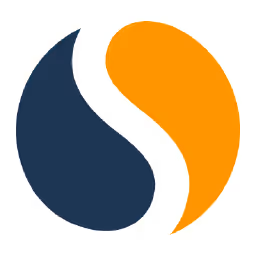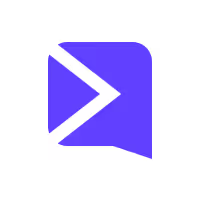CloudTalk Alternatives
Find your CloudTalk alternative. We compare 10 providers on features, pricing, and performance to help you make an informed decision.
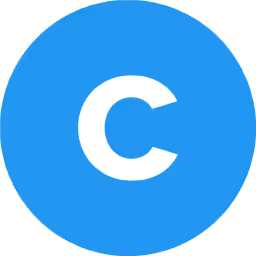
CloudTalk is a popular choice, and for good reason. It performs well for its core functions, like power dialing and call routing, which is why many teams choose it.
However, some users report occasional call quality issues and find the interface complex. We've analyzed the best alternatives, comparing their advantages and drawbacks based on reviews to help you choose. Let's get started.
11x: Digital Workers For Sales
For teams interested in digital workers, 11x is a relevant option. It automates certain sales activities, allowing your staff to concentrate on higher-value interactions. Evaluate how this approach could support your sales objectives.
11x is a go-to-market platform using AI agents to manage the sales process. These agents, named Alice and Julian, operate autonomously. Alice finds prospects, conducts outreach, and maintains the CRM, while Julian qualifies inbound leads and books meetings.
This model replaces the need for separate tools for data enrichment, outreach, or email warmup by combining these functions into one platform.
CloudTalk Alternatives
The following section provides a detailed breakdown of each CloudTalk alternative. The analysis covers pricing, features, and the primary advantages and drawbacks relative to CloudTalk.
1) Aircall
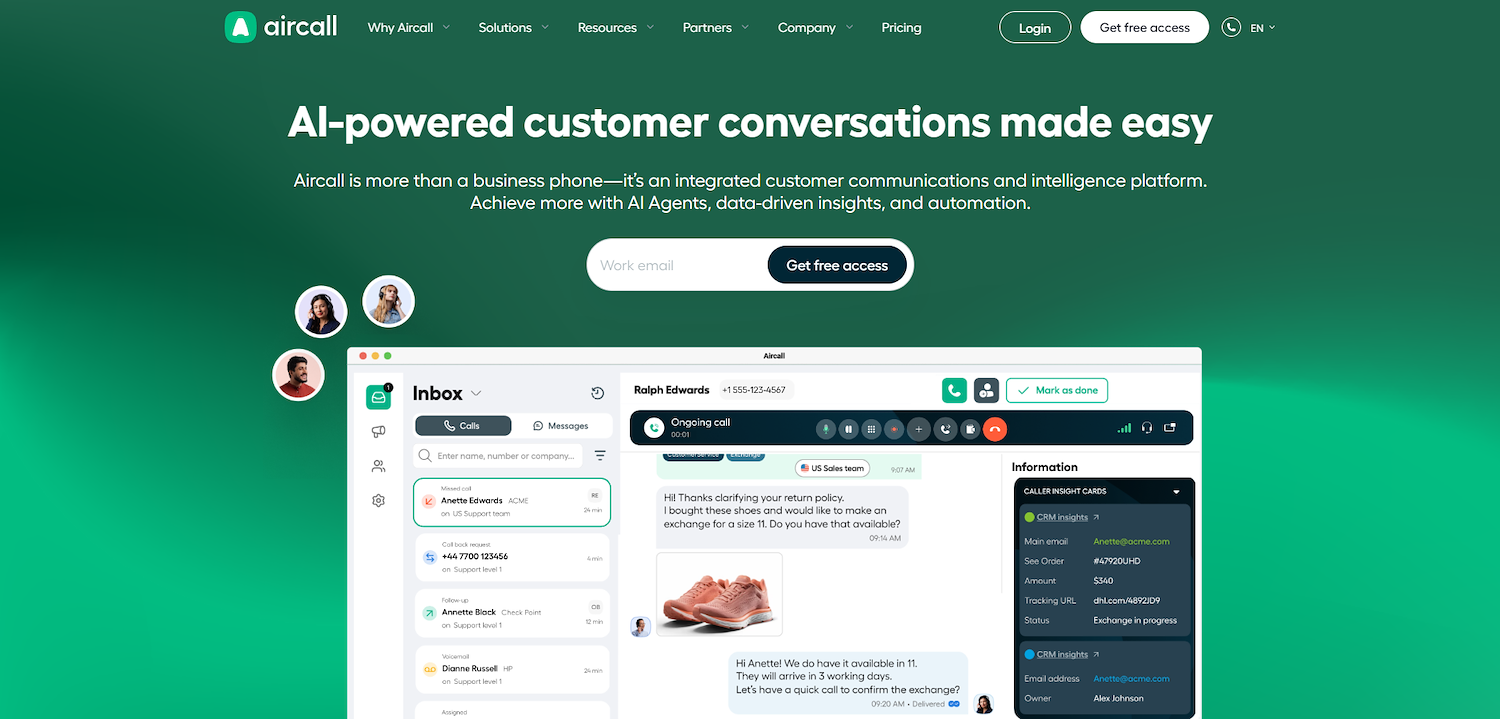
Aircall is a cloud communications platform for sales and support teams. It combines voice, SMS, and WhatsApp and offers a Power Dialer for outbound sales. The service supports over 20,000 companies with rapid, hardware-free deployment, 100+ integrations, and AI agents to handle calls.
Aircall's Main Features
- Offers an AI Voice Agent for 24/7 autonomous handling, qualification, and routing of inbound calls.
- Provides AI Assist for real-time coaching during live calls and automated follow-up workflows.
- Manages WhatsApp conversations alongside calls and texts within one unified workspace.
- Tracks key performance indicators, surfaces trending topics, and identifies calls needing review with powerful analytics.
How Aircall Compares To CloudTalk
Average Review score: 4.4/5 stars based on 1,314 G2 reviews.
- Aircall provides an intuitive user interface that many users find straightforward, whereas some CloudTalk users report its interface can be complex to navigate.
- It includes an AI Voice Agent to manage inbound calls 24/7, which offers a different approach to automation compared to CloudTalk's standard call routing.
- The tool often receives praise for clear international call quality, a point of contrast to some CloudTalk reviews that mention occasional quality issues.
- This platform unifies voice, SMS, and WhatsApp communications in one workspace, which provides broader channel support than CloudTalk's primary focus on calls.
Potential Aircall Limitations vs. CloudTalk
- Aircall's pricing plans require a three-user minimum, which can be a barrier for very small teams. This structure may be less flexible for businesses just starting out compared to CloudTalk, which might offer plans that scale from a single user.
- Some users report that the application can take time to load and that the mobile app occasionally lags. This performance can differ from CloudTalk, which users often note for the reliability of its core functions.
- While the tool provides analytics, some reviews suggest the reports could be more detailed. Teams that require deep, customizable data may find CloudTalk's reporting suite offers more advanced options for tracking metrics.
Pricing and Cost-Effectiveness
Aircall's pricing starts at $30 per user per month, billed annually, with a three-user minimum. This makes it less flexible for very small teams compared to CloudTalk, which may offer more cost-effective plans that scale from a single user.
2) RingCentral MVP
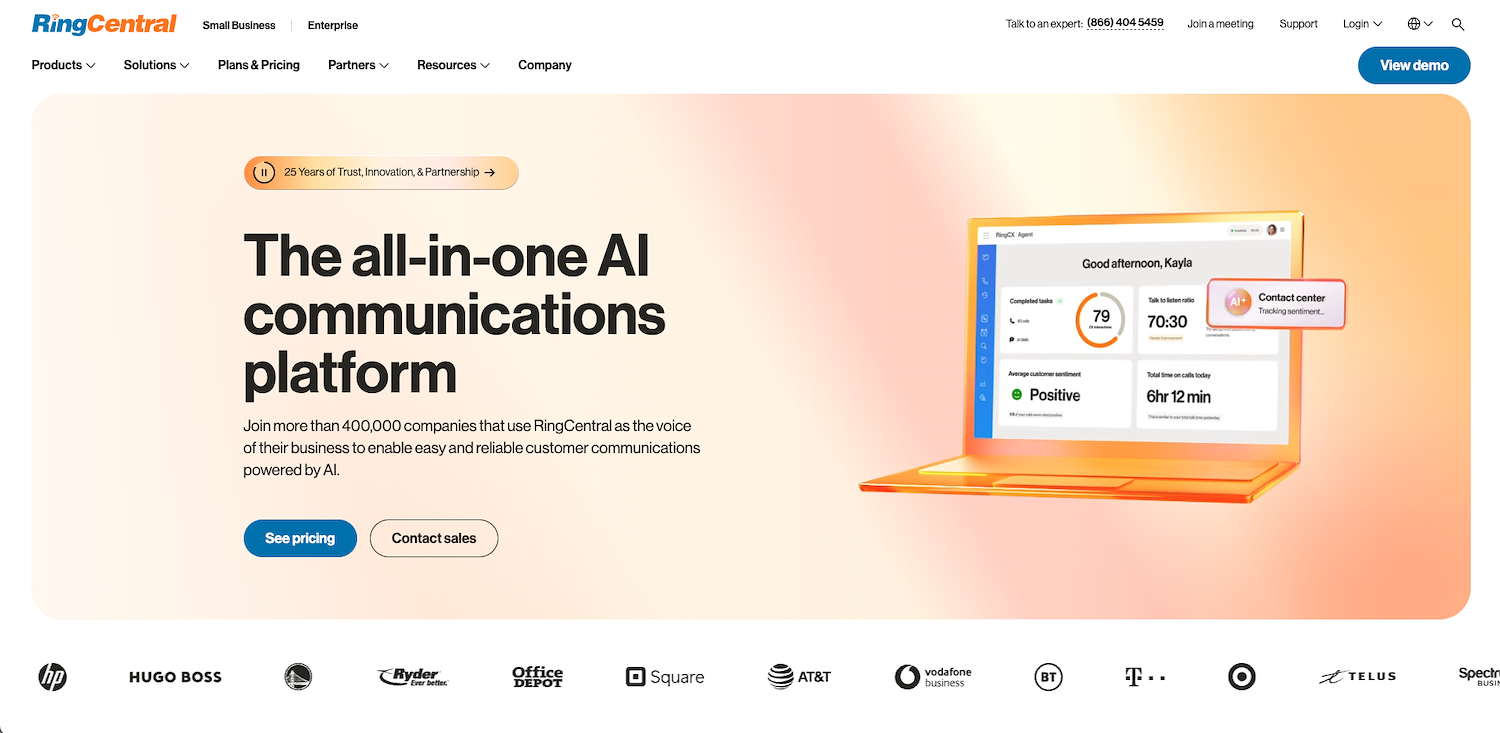
RingCentral MVP is a unified communications platform. It offers messaging, video, and phone services in a single application for business use. The phone system provides call management and analytics for sales and support teams. The platform acts as a central hub for communications and can replace multiple separate tools.
RingCentral MVP's Main Features
- Integrates messaging, video, and phone services into a single application.
- Provides call management and analytics for sales and support teams.
- Functions as a central communications hub to replace multiple separate tools.
How RingCentral MVP Compares To CloudTalk
Average Review score: 4.0/5 stars based on 154 G2 reviews.
- RingCentral MVP supports omnichannel communication across voice and over 30 digital channels like social media. This is a broader range of contact methods than CloudTalk, which focuses mainly on voice.
- It offers more than 300 prebuilt integrations, providing greater connectivity options. CloudTalk, in comparison, has a more limited number of available integrations for users.
- The platform uses advanced AI, such as Intelligent Virtual Agents, for customer self-service. This provides a different type of automation compared to CloudTalk's core features like power dialing and call routing.
- This tool includes a fully integrated, AI-powered workforce management solution. This feature gives teams more advanced analytics and oversight than the standard reporting available in CloudTalk.
Potential RingCentral MVP Limitations
- The platform's implementation time is around two months, which may be a factor for teams that require a quicker setup compared to CloudTalk's often faster deployment.
- Some users report occasional issues with call functionality and quality. This can be a point of consideration, as many teams choose CloudTalk for its reliable core calling features.
- Its pricing is sometimes perceived as high, making it a better fit for larger companies. CloudTalk, in contrast, provides plans that scale from one user, offering more flexibility for small teams.
Pricing and Cost-Effectiveness
RingCentral MVP's pricing is generally geared towards larger companies, while CloudTalk offers more flexible plans that can scale from a single user. For the most accurate and up-to-date pricing information, we recommend visiting RingCentral MVP's official website.
3) Talkdesk
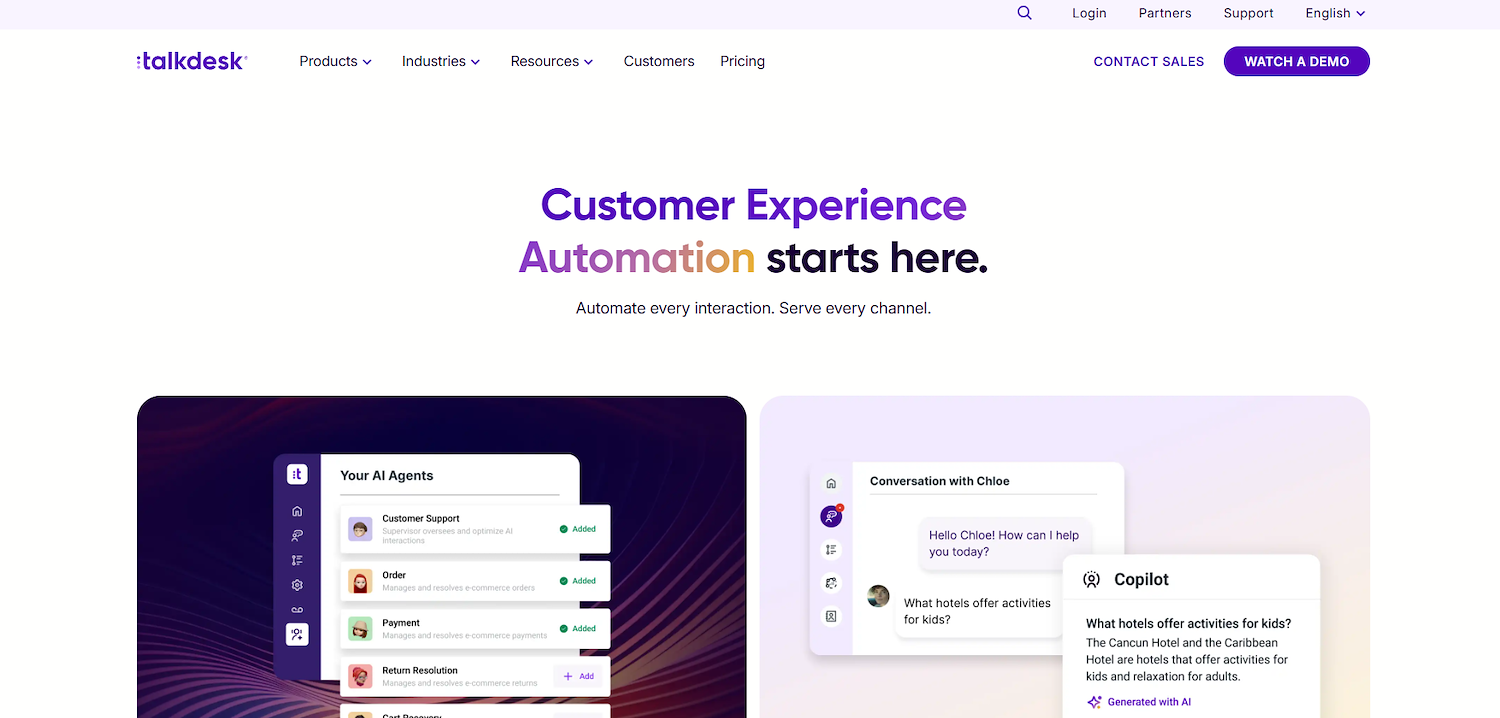
Talkdesk is an AI-first cloud contact center platform that uses artificial intelligence to automate the customer experience. It delivers proactive service and supports omnichannel engagement across voice, chat, social media, and SMS.
The platform also handles proactive outbound campaigns for collections or marketing offers. It provides a modern alternative to legacy phone systems with enterprise-grade reliability and global availability.
Talkdesk's Main Features
- Offers industry-specific “Experience Clouds” for sectors like travel, hospitality, and financial services.
- Provides Talkdesk Embedded to place contact-center functionality directly inside other software.
- Uses Multi-Agent Orchestration to coordinate numerous AI and human agents.
- Includes Identity & Compliance monitoring to ensure secure customer interactions.
How Talkdesk Compares To CloudTalk
Average Review score: 4.4/5 stars based on 2,431 G2 reviews.
- Talkdesk provides industry-specific solutions for sectors like healthcare and finance, which offer tailored workflows that CloudTalk's more general platform does not.
- It uses advanced AI for multi-agent orchestration to coordinate both human and AI agents. This approach differs from CloudTalk's focus on core calling automation like power dialing.
- The platform supports a wider range of channels, including social media and chat, for omnichannel engagement, whereas CloudTalk primarily concentrates on voice communications.
- This tool offers an embedded function to place its contact center features directly into other software, providing a level of integration beyond CloudTalk's standard CRM connections.
Potential Talkdesk Limitations vs. CloudTalk
- Talkdesk's pricing plans are generally higher, which can be a barrier for smaller businesses. CloudTalk, in comparison, offers more flexible plans that can scale from a single user, making it more accessible for small teams.
- The platform's focus on enterprise-level AI automation can introduce complexity for some teams. In contrast, CloudTalk provides core calling features like a power dialer that are often more straightforward for sales teams to adopt.
- Some users note occasional technical issues or problems with call stability. Teams that depend heavily on reliable, basic call functions might find CloudTalk's performance on its core features to be more consistent for their needs.
Pricing and Cost-Effectiveness
Talkdesk's pricing begins at $85 per user per month, positioning it for larger, enterprise-level teams. CloudTalk, in contrast, offers more flexible plans that can scale from a single user, making it a more cost-effective option for small businesses.
4) Five9
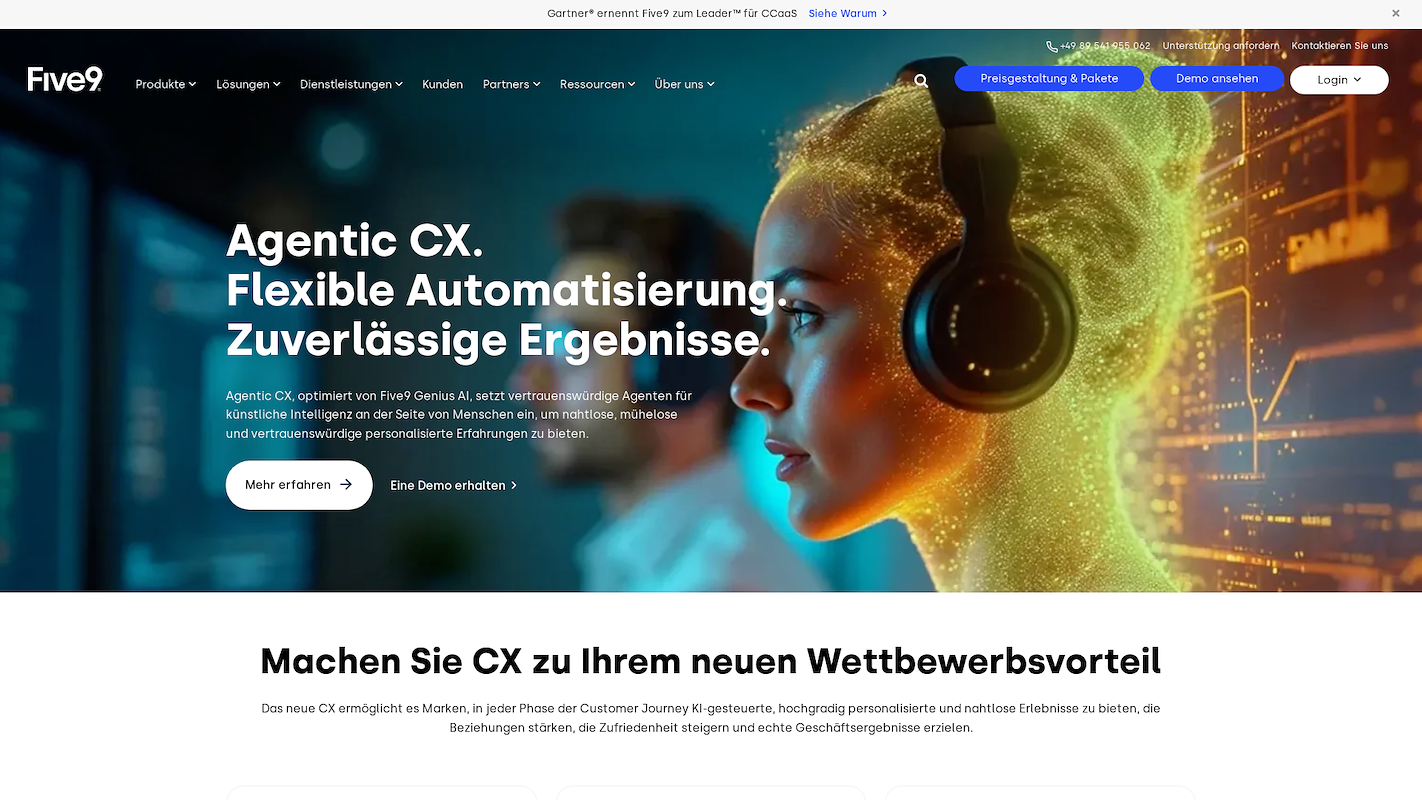
Five9 is a cloud contact center that provides tools for customer engagement. The platform gives sales and service teams tools for inbound and outbound communication, with specific dialer functions. This system lets companies connect with customers and manage interactions from one place.
Five9's Main Features
- Includes a GenAI Studio for building custom conversational and generative AI agents.
- Provides employee engagement tools for workforce management, quality control, and performance gamification.
- Offers an intelligent CX platform with end-to-end journey orchestration and a 99.999% uptime service level agreement.
- Supports a range of digital channels, including chat, email, social media, SMS, and video for omnichannel communication.
How Five9 Compares To CloudTalk
Average Review score: 4.1/5 stars based on 533 G2 reviews.
- Five9 includes a GenAI Studio to build custom AI agents, which provides more advanced automation options compared to CloudTalk's standard call routing and power dialing features.
- It offers employee engagement tools like performance gamification. This is a different area of focus from CloudTalk, which centers on core calling productivity tools.
- The platform guarantees reliability with a 99.999% uptime service level agreement. This provides a formal assurance that contrasts with some user reports of occasional call quality issues on CloudTalk.
- This tool supports omnichannel communication across social media, email, and video, offering a wider range of channels than CloudTalk's primary focus on voice.
Potential Five9 Limitations vs. CloudTalk
- Five9's implementation can take around two months and may require specialized knowledge for setup. This is different from CloudTalk, which often allows for a faster deployment for teams that need to get operational quickly.
- Some users report that its user interface can feel dated or unintuitive, especially the admin tools. While CloudTalk has its own learning curve, its focus on core calling features can present a more direct user experience for some teams.
- The tool's reporting system sometimes experiences delays in generating reports, which can affect real-time monitoring. CloudTalk, in comparison, is often chosen for the reliability of its core analytics and reporting functions.
- Its pricing structure is generally designed for larger companies, which might not be as flexible for smaller teams. CloudTalk offers plans that scale from a single user, providing a more adaptable cost model for growing businesses.
Pricing and Cost-Effectiveness
Five9's pricing is generally designed for larger companies, while CloudTalk offers more flexible plans that can scale from a single user. For the most accurate and up-to-date pricing information, we recommend visiting Five9's official website.
5) Dialpad Ai Voice
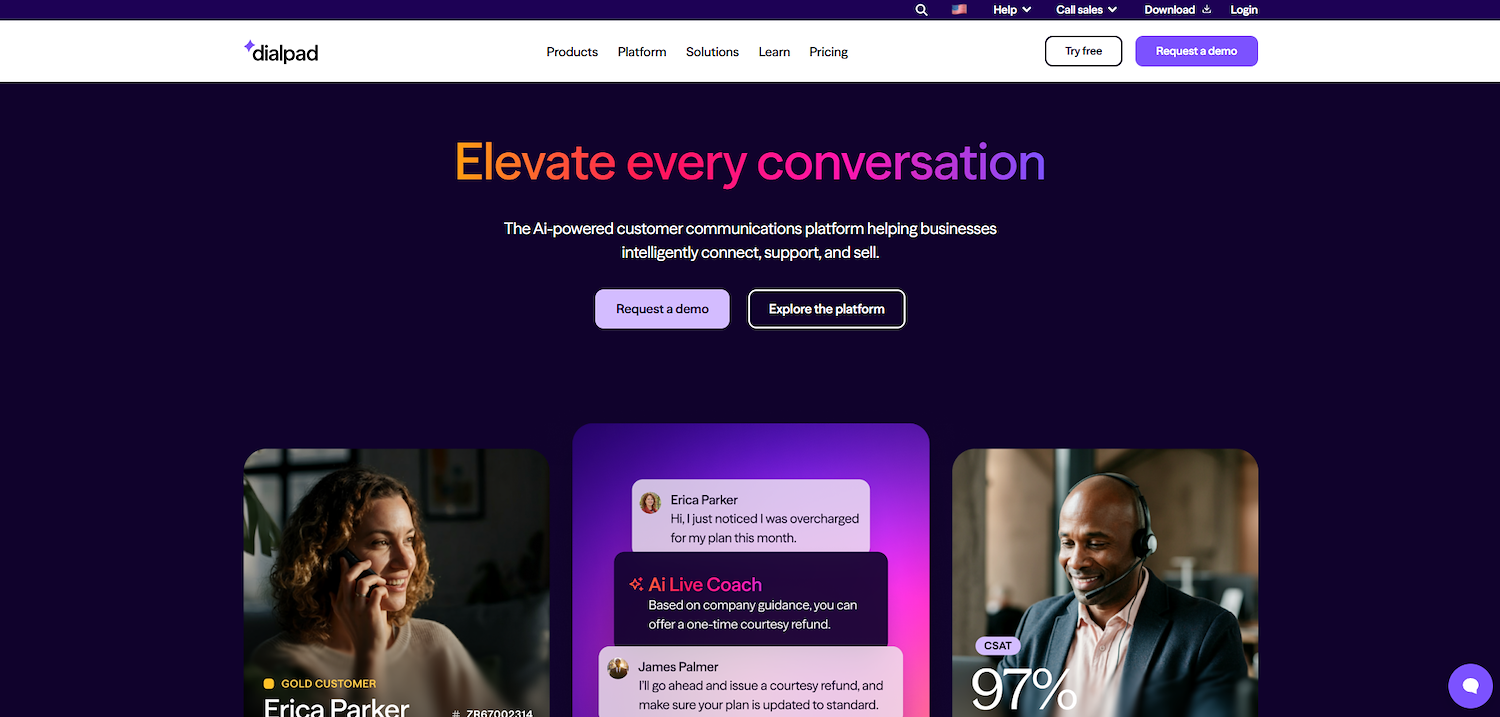
Dialpad Ai Voice is a business phone system that uses artificial intelligence to support communications. The platform offers a phone dialer and other tools for sales and support teams.
It centralizes voice interactions within a single application. This structure allows teams to handle calls and analyze conversations with the help of its AI features.
Dialpad Ai Voice's Main Features
- Offers a core AI layer that provides real-time transcription, sentiment analysis, CSAT scoring, and automated action-item extraction.
- Combines calling, messaging, and video meetings into one cloud application with AI summaries and action items.
- Includes an outbound sales dialer that provides real-time AI coaching, insights, and workflow automations.
- Features a contact center with AI agents, live coaching for human agents, and deep analytics.
How Dialpad Ai Voice Compares To CloudTalk
Average Review score: 4.4/5 stars based on 3,901 G2 reviews.
- Dialpad Ai Voice provides real-time AI assistance during calls, including transcriptions and sentiment analysis. This offers deeper conversational insights than CloudTalk's standard call routing and power dialing features.
- It unifies voice, messaging, and video into a single application. This provides a broader communication suite compared to CloudTalk, which primarily concentrates on voice calls.
- The platform automatically creates call summaries and extracts action items using AI. This offers a different type of post-call workflow automation than CloudTalk's core call logging and analytics.
- Its sales dialer offers real-time AI coaching to guide agents during live conversations. This provides a different kind of support than CloudTalk's power dialer, which focuses on call volume and efficiency.
Potential Dialpad Ai Voice Limitations
- Some users report occasional connection glitches or issues with call transfers. This can be a factor for teams that require the consistent call stability often found in CloudTalk's core functions.
- The platform's wide range of AI features can introduce a learning curve for administrators. In comparison, CloudTalk's focus on core call center tools may offer a more straightforward setup for some teams.
- Its pricing structure may include added fees for certain services like SMS. Businesses might find CloudTalk's plans offer more predictable costs if those features are bundled inclusively.
Pricing and Cost-Effectiveness
Dialpad Ai Voice's pricing starts at $15 per user per month with annual billing. While this offers a competitive entry point, CloudTalk's plans are often noted for their flexibility, scaling from a single user, which can be more adaptable for very small teams.
Try 11x for Digital Sales Workers
For teams that want to automate sales, 11x offers digital workers to handle outreach and lead qualification. This approach lets your sales staff focus on closing deals and building relationships. It is a different model than traditional call center software.
If your goal is to automate top-of-funnel sales tasks instead of a focus on call efficiency, 11x is worth a look. Evaluate how its autonomous AI agents could fit into your sales process and support your growth objectives.
At 11x, we use AI agents to run the sales process. Alice identifies prospects and handles outreach, while Julian qualifies inbound leads and schedules meetings. Our platform replaces multiple tools for data, outreach, and email warmup by combining these functions.
Book a demo to see 11x in action.
6) Genesys Cloud CX
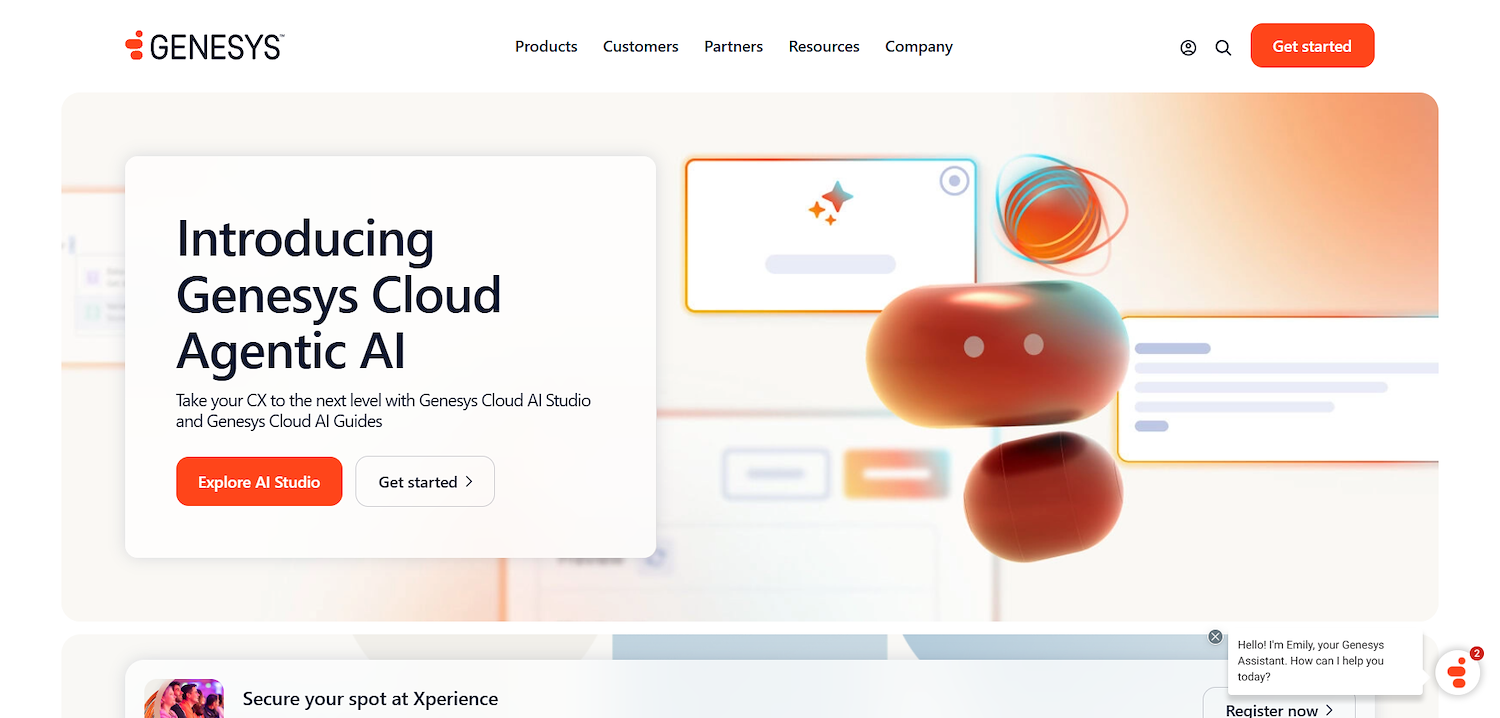
Genesys Cloud CX is an all-in-one cloud contact center platform. It uses artificial intelligence to orchestrate customer experiences across voice and digital channels. The system provides tools for both sales and service teams to manage customer interactions from a single interface.
It supports proactive outreach and personalized customer journeys. This can be a fit for teams that require phone dialer functions alongside broader customer engagement capabilities.
Genesys Cloud CX's Main Features
- Unifies voice, chat, email, social, and SMS interactions into a single interface for omnichannel engagement.
- Uses purpose-built AI for predictive engagement, self-service bots, and providing next-best-action guidance.
- Provides workforce engagement management tools, including forecasting, scheduling, and performance gamification.
- Connects data from different systems to manage and optimize the entire customer and employee journey.
How Genesys Cloud CX Compares To CloudTalk
Average Review score: 4.4/5 stars based on 1,432 G2 reviews.
- Genesys Cloud CX unifies communication across voice, chat, email, and social media. This provides a wider range of channels compared to CloudTalk's primary focus on voice calls.
- It uses purpose-built AI to offer predictive engagement and guide agents with next-best-action suggestions. This is a different approach to automation than CloudTalk's core power dialing and call routing features.
- The platform includes workforce engagement tools like performance gamification and scheduling. These features offer management capabilities beyond the standard analytics available in CloudTalk.
- This tool connects data from multiple systems to provide a complete view of the customer journey. CloudTalk, in comparison, offers a more limited set of integrations.
Potential Genesys Cloud CX Limitations
- Genesys Cloud CX is a comprehensive platform, which can be complex for teams that only need core calling functions. CloudTalk, in contrast, offers a more focused toolset that may be simpler to adopt for specific sales tasks.
- The platform's implementation can take several months, which might not suit teams requiring a quick setup. In comparison, CloudTalk often provides a faster deployment process for its main features.
- Its pricing structure is generally better for larger companies. CloudTalk offers more flexible plans that scale from a single user, which can be a more suitable option for smaller businesses.
- Some users report that the platform has data retention limits, such as keeping call recordings for only 90 days. This could be a factor for teams that need longer-term access to call history.
Pricing and Cost-Effectiveness
Genesys Cloud CX's pricing is generally better for larger companies, while CloudTalk offers more flexible plans that scale from a single user. For the most accurate pricing information, we recommend visiting Genesys Cloud CX's official website.
7) NICE CXone
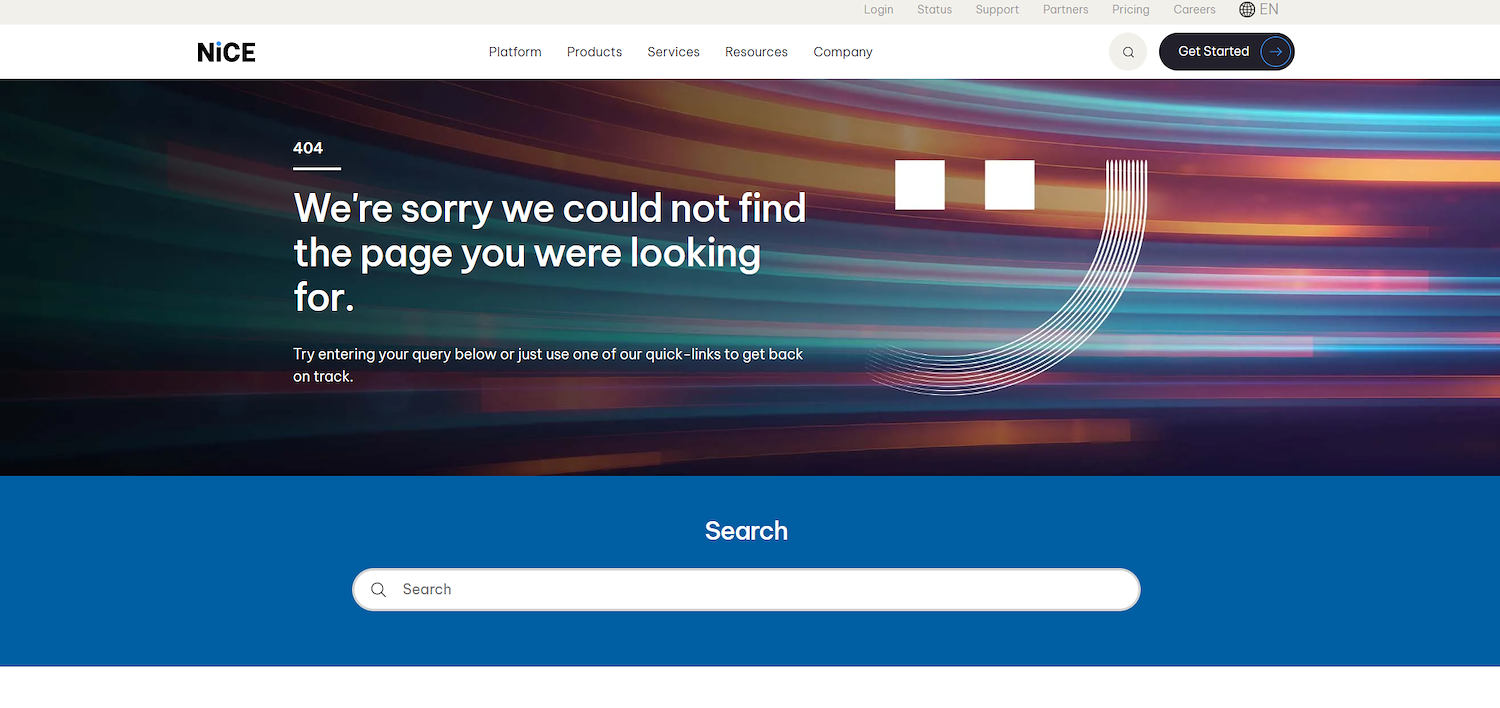
NICE CXone is a cloud customer experience platform that unifies digital and voice channels. It provides tools for sales and service teams to manage inbound and outbound communications, including dialer functions for proactive outreach. The system also includes workforce engagement and automation features within a single application.
NICE CXone's Main Features
- Unifies customer interactions across both digital and voice channels within a single platform.
- Includes workforce engagement features to manage team performance and operations.
- Provides native automation tools to support various communication workflows.
How NICE CXone Compares To CloudTalk
Average Review score: 4.3/5 stars based on 1,718 G2 reviews.
- NICE CXone unifies customer interactions across digital and voice channels. This offers a broader range of contact options than CloudTalk, which concentrates on voice.
- It includes workforce engagement tools for managing team performance. This provides a different set of management features compared to CloudTalk's focus on call productivity.
- The platform uses native automation to support complex communication workflows. This approach differs from CloudTalk's automation, which centers on call routing and power dialing.
- Reviewers often note its intuitive interface and reliable call quality. This contrasts with some user reports of a complex interface and occasional call issues on CloudTalk.
Potential NICE CXone Limitations vs. CloudTalk
- NICE CXone's pricing plans are generally designed for larger teams. CloudTalk, in comparison, offers more flexibility for small businesses with plans that can scale from a single user.
- Some users report the platform has a steep learning curve, especially for custom reports. In contrast, CloudTalk's focused feature set can be simpler for teams that need core calling functions without extensive configuration.
- The tool sometimes has occasional timeouts or dropped calls, according to user reviews. CloudTalk, on the other hand, is often chosen for the reliability of its primary calling features.
Pricing and Cost-Effectiveness
NICE CXone's pricing begins at $71 per agent per month for digital channels and $94 for voice. In contrast, CloudTalk offers more flexible plans that can scale from a single user, which can be a more cost-effective option for smaller businesses.
8) 8x8 Contact Center
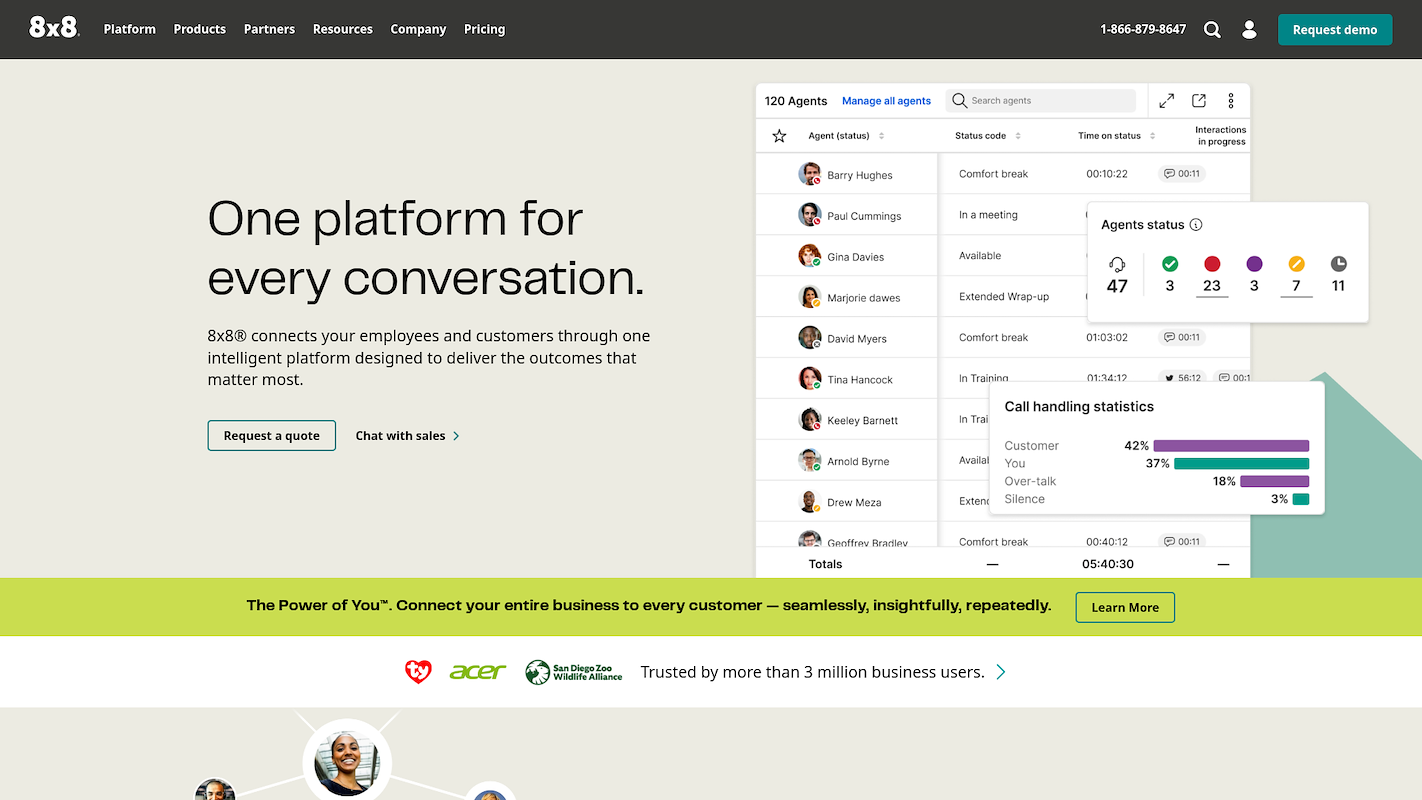
8x8 Contact Center is a cloud platform for communications and contact center operations. It handles customer interactions on voice and digital channels. The system includes a phone dialer for outbound sales campaigns and tools for service teams.
This structure lets a business manage all customer contacts from one application. It enables proactive work for sales or service follow-up.
8x8 Contact Center's Main Features
- Offers conversational AI to deliver self-service experiences across all channels for various customer inquiries.
- Routes interactions based on skills across voice, web chat, email, SMS, social media, and messaging.
- Provides dedicated agent and supervisor workspaces to manage interactions and performance from a single interface.
- Includes full PSTN replacement in 58 countries and territories.
How 8x8 Contact Center Compares To CloudTalk
Average Review score: 4.1/5 stars based on 215 G2 reviews.
- 8x8 Contact Center routes interactions across voice, chat, email, and social media, offering more channels than CloudTalk's primary focus on voice.
- It provides full PSTN replacement in 58 countries, which presents a different global infrastructure compared to CloudTalk's international calling features.
- The platform includes a financially backed 99.999% uptime SLA, offering a formal reliability guarantee that contrasts with some user reports of occasional call issues on CloudTalk.
- This tool uses conversational AI for self-service across all channels, providing a different type of automation than CloudTalk's power dialing and call routing.
Potential 8x8 Contact Center Limitations
- Some teams find the platform's comprehensive features introduce a learning curve. In comparison, CloudTalk offers a more focused toolset that can be simpler for teams needing core calling functions.
- The platform's implementation can take around three months, which might not suit teams that need a quicker setup. CloudTalk often provides a faster deployment process for its main features.
- Its pricing structure is generally a better fit for larger companies. CloudTalk, on the other hand, offers plans that scale from a single user, providing more flexibility for small businesses.
Pricing and Cost-Effectiveness
8x8 Contact Center's pricing is generally a better fit for larger companies, while CloudTalk offers more flexible plans that can scale from a single user. For the most accurate and up-to-date pricing information, we recommend visiting 8x8 Contact Center's official website.
9) Zendesk Talk
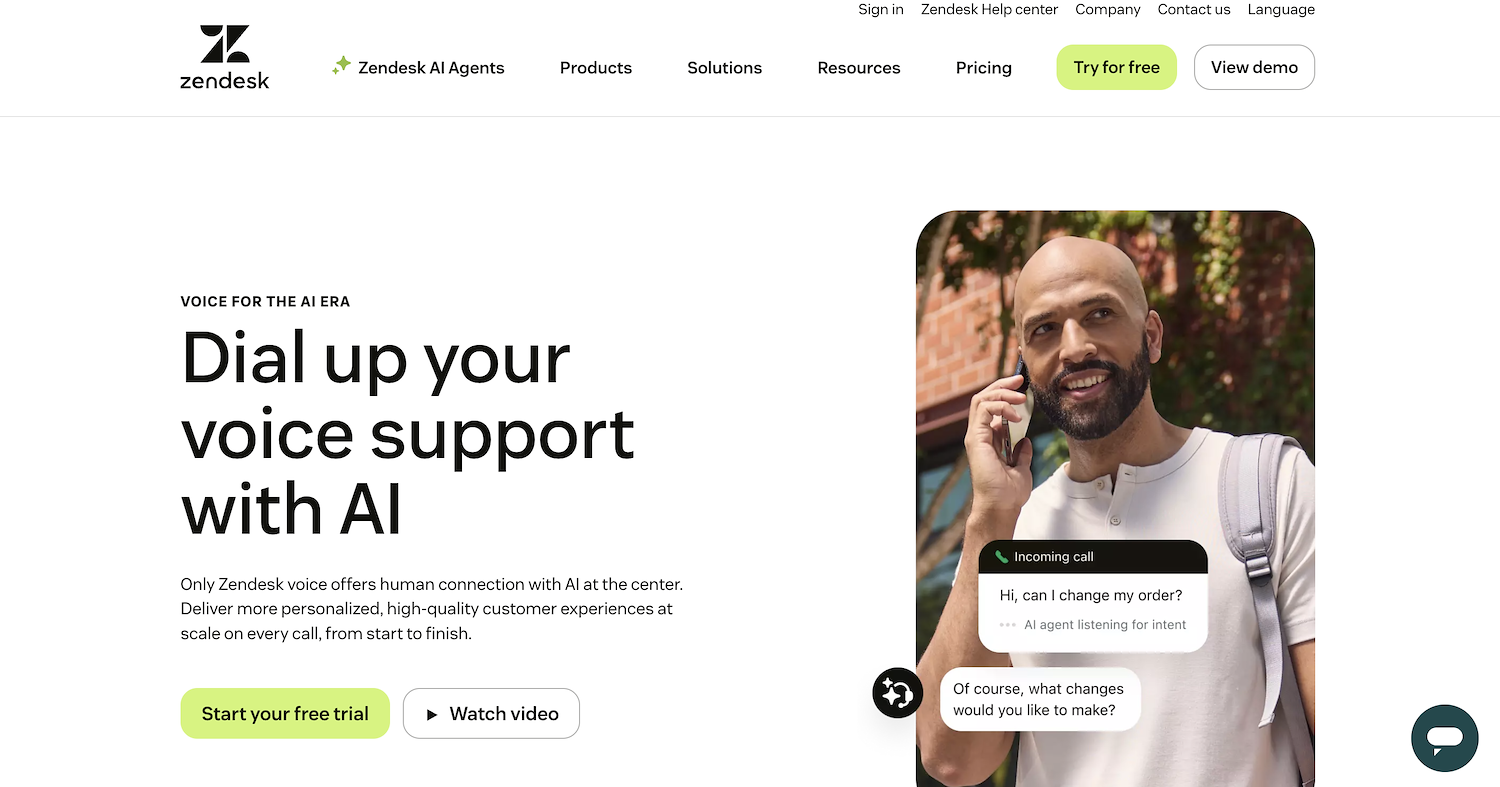
Zendesk Talk is a cloud-based call center software built into the Zendesk support platform. Agents handle phone support and other customer conversations from a single interface. The system supports inbound and outbound calls from a local number and maintains a recorded history of all calls.
Teams can also use it for text messages with customers, call forward functions, and conference calls.
Zendesk Talk's Main Features
- Manages customer issues through a ticket and case management system.
- Integrates communication channels like social messaging, phone, and email into one platform.
- Offers a customer portal for self-service support.
- Uses AI-powered workflows to automate service tasks.
How Zendesk Talk Compares To CloudTalk
Average Review score: 4.3/5 stars based on 6,256 G2 reviews.
- Zendesk Talk operates within a full support suite that includes ticket and case management. This is different from CloudTalk, which focuses primarily on voice communication tools.
- It integrates multiple communication channels like social messaging and email into one platform. CloudTalk, in comparison, concentrates mainly on its phone system.
- The platform uses AI-powered workflows to automate a wide range of service tasks. This provides a different type of automation than CloudTalk's focus on call efficiency features like the power dialer.
- This tool offers a customer portal for self-service support. This feature gives customers another way to find answers, which is not a core part of the CloudTalk platform.
Potential Zendesk Talk Limitations vs. CloudTalk
- Zendesk Talk is built into a support platform, so it lacks specialized sales features like a power dialer. CloudTalk, in contrast, provides tools designed specifically for high-volume outbound sales campaigns.
- The platform's primary focus is on ticketing and overall customer service, not just voice. Some teams might find that CloudTalk offers more consistent performance for core calling functions, as that is its main specialty.
- It operates within a large ecosystem of support tools, which can introduce complexity for teams that only need a phone system. CloudTalk presents a more direct solution for businesses that prioritize voice communication without the extra features of a full help desk.
Pricing and Cost-Effectiveness
Zendesk Talk is included in the Zendesk Suite, so its pricing reflects a full support platform. This may be a better value for teams needing an all-in-one solution. CloudTalk, in contrast, offers more flexible plans for businesses that only require a standalone voice tool.
Zendesk's Support Only plan starts at $19 per user per month, bundling voice with its ticketing system. In contrast, CloudTalk offers flexible pricing for teams that only need a standalone voice tool, with plans that scale from a single user.
10) Nextiva
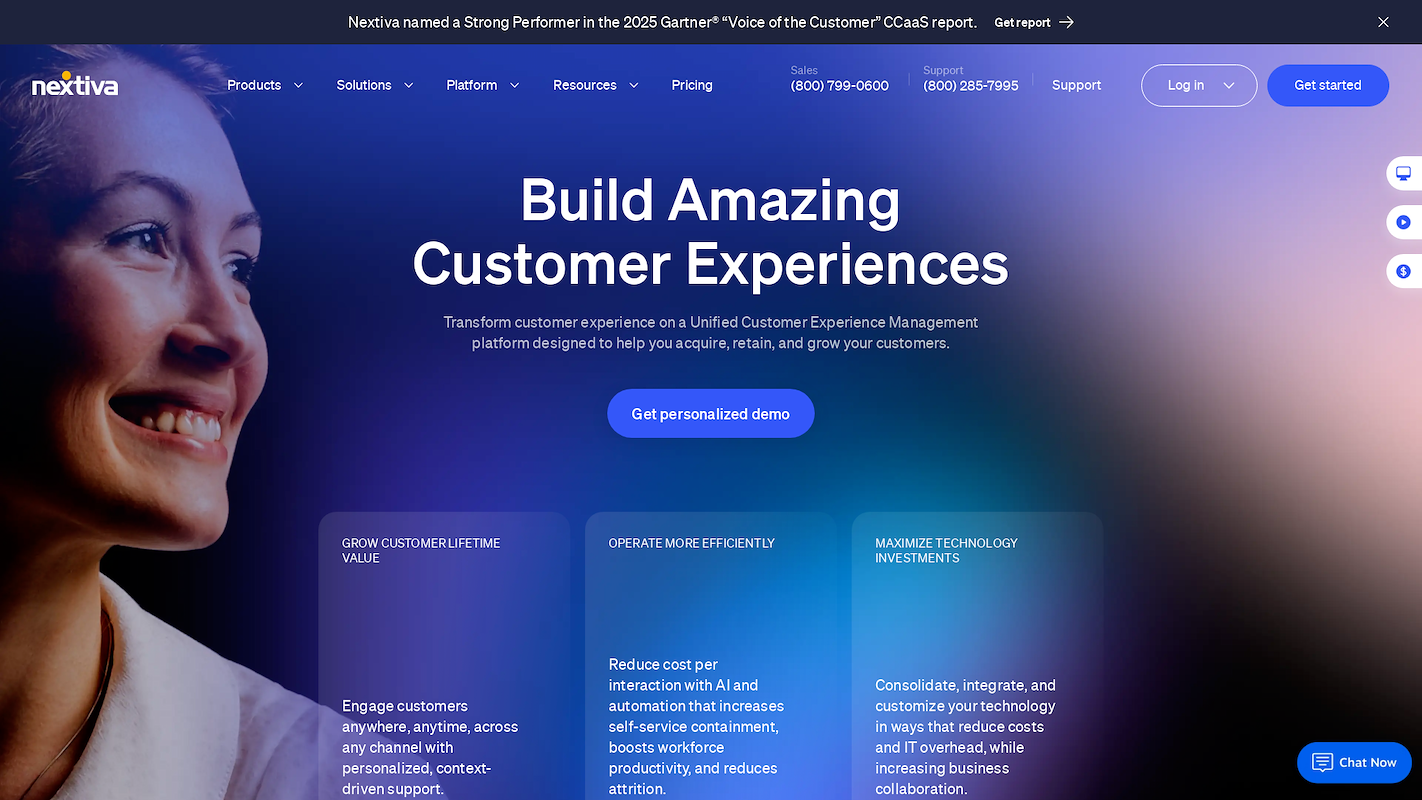
Nextiva is a business communications platform that puts phone, video, and team chat into one application. It provides tools for sales and service teams, with phone dialer functions for outbound campaigns.
The system allows companies to manage customer interactions from a single place. It supports both inbound and outbound communication for sales and support operations.
Nextiva's Main Features
- Combines phone calls, video calls, and instant messaging within a single application.
- Provides advanced features such as hold music, automated attendants, and a VoIP number.
- Offers access through software pairing, a browser extension, or an individual application download.
- Includes reporting and dashboards for administrative monitoring and analysis.
How Nextiva Compares To CloudTalk
Average Review score: 4.5/5 stars based on 3,333 G2 reviews.
- Nextiva combines phone, video, and team chat in one application, offering a broader communication suite than CloudTalk, which focuses mainly on voice.
- It includes an automated attendant to direct callers without a live operator, which provides a different type of call management compared to CloudTalk's standard call routing system.
- The tool offers a browser extension for quick access to its communication features, which can be more convenient for some users than navigating a full application like CloudTalk.
- This platform provides HIPAA-compliant communication options, making it a suitable choice for healthcare organizations. This is a specific compliance feature not highlighted for CloudTalk.
Potential Nextiva Limitations vs. CloudTalk
- Nextiva focuses on unified communications and does not offer a specialized power dialer. In contrast, CloudTalk provides this feature for sales teams that require a high volume of outbound calls.
- The platform sometimes requires users to contact support for configuration changes. This is different from CloudTalk, which generally allows teams to manage their own settings directly within the application.
- Some users report occasional issues with call stability. This may be a consideration for teams that prioritize consistent performance, as CloudTalk is often noted for the reliability of its core calling features.
Pricing and Cost-Effectiveness
Nextiva offers plans starting at $20 per user per month. While this provides a clear entry point, CloudTalk is often noted for its flexible pricing that scales from a single user, which can be more cost-effective for smaller teams.
Which One Should You Go With?
Choosing the right CloudTalk alternative depends on your team's specific needs, from call volume to integration requirements. This guide reviewed several options, highlighting their features and potential drawbacks to inform your decision.
If your focus is on automating sales outreach and lead qualification rather than call management, 11x offers a different approach. Its digital workers handle top-of-funnel tasks, allowing your sales team to concentrate on closing deals.


